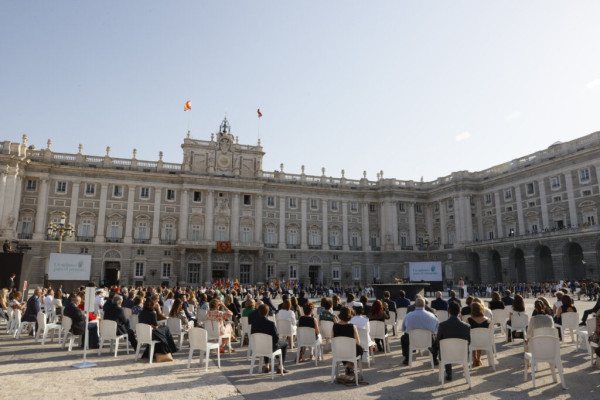€500B remains unspent from EU’s Covid recovery fund
BRUSSELS — Governments have received less than a third of the EU's original €723 billion pot to help boost post-Covid economic recovery and are now heaping pressure on the European Commission to speed up payments.
Countries are demanding the Commission slash the mountain of red tape that is preventing them from getting their hands on their share of Recovery and Resilience Facility (RRF) cash or discouraging them from applying in the first place — sparking fears they will miss out on huge amounts of money when the initiative expires in 2026. It comes as the fund is mired in a corruption scandal with Italian police arresting more than 20 suspects across the EU as part of an investigation into fraud of more than €600 million.
One national official who spoke to POLITICO lamented the hoops countries had to jump through to access the money — which is made up of grants and loans — describing the Commission’s strict checks on funding proposals as "more similar to an audit." Another diplomat said governments were beginning to think requesting loans under the RRF was "not worth the effort."
The Commission is exploring ways of speeding up cash handouts, according to people with knowledge of private discussions.
The EU executive has already reduced the total amount available from €723 billion to €648 billion after governments failed to apply for almost €100 billion in loans before an interim end-2023 deadline.
Spain has received just a fraction
When the EU set up the RRF in 2021 it shattered one of the bloc's longstanding taboos of countries raising money on debt markets jointly. The unique setup means that rather than billions of euros lying unused if funds are unclaimed by the end-2026 expiration date ― as governments now increasingly expect will be the case ― the bloc simply won't borrow the money in the first place.
So far, the Commission has unblocked just €225 billion. Spain, which is supposed to be the second-biggest recipient after Italy, has received just €340 million in loans — a tiny fraction of the €83 billion that was earmarked in 2021.
Countries have to submit a "recovery plan" setting out how the cash would be used and which reforms it will push through in return. Now they are urging the Commission to go through this paperwork at a faster pace.
“The Commission cannot change the regulation, but they can choose the interpretation" of the rules for releasing funds, said Atanas Pekanov, a former Bulgarian government official who was closely involved in drawing up his country's recovery plan. "They can be more or less strict, and decide what has been sufficiently fulfilled."
The Commission is being 'pedantic'
A main reason for the bottleneck is that the Commission sees the fund as a tool for forcing governments to carry out reforms on a range of issues ― including pensions and democratic standards ― that have been on the backburner for years.
Countries must change laws — known as “milestones” in Brussels jargon — and fulfill specific targets before money gets released.
But the Commission has been "too pedantic at times when assessing whether we met the milestones," Pekanov said.

A second government official agreed, saying there needed to be “more flexibility in the process of assessment of the milestones and targets.”
The Commission is looking at ways to speed up disbursement without formally changing the rules, although it hasn't said that publicly. Brussels mainly lays the blame for the slow take-up at the door of governments.
Reluctance to carry out some reforms
“The speed also largely depends on when the member states achieve the milestones and targets included in their plans and submit the relevant payment requests,” Commission spokesperson Lea Zuber said. “Disbursements to the member states are picking up” after they spent years negotiating and revising their plans, delaying the process.
The Commission said it expects to hand out 54 percent of the cash by the end of 2024.
Several countries — especially those that can borrow at low cost from financial markets — are reluctant to carry out unpopular domestic reforms in exchange for loans which they will have to eventually hand back to the Commission.
An EU official said the Commission introduced stricter checks as a sop to frugal governments, mainly countries in northern Europe, which worried the money would be misspent.
The EU’s auditing watchdog suggested that weak checks by Brussels authorities and tight deadlines potentially increase the scope for fraud.
“The big issue and reputational risk is that the payments are fine when they’re being made but the Commission is not sufficiently controlling subsequent expenditure,” Tony Murphy, the head of the European Court of Auditors (ECA), told reporters earlier this year.
There is increasing scrutiny on whether the rules are too strict ― or conversely, whether the Commission is right in its rigidity ― because some national leaders and senior officials are calling for similar financing initiatives, such as to fund defense and green spending, in the years to come.
Economists Tito Boeri and Roberto Perotti warned in an interview with POLITICO that misusing recovery cash would simply confirm to less indebted countries, like Germany and the Netherlands, that new joint borrowing is fraught with too much risk.
“A lot will depend on the perception among frugal countries of whether the money was well-spent by countries that received the most funding,” Perotti said. “The next three years are crucial.”